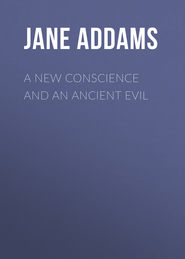По всем вопросам обращайтесь на: info@litportal.ru
(©) 2003-2024.
✖
Democracy and Social Ethics
Настройки чтения
Размер шрифта
Высота строк
Поля
After all, what the corrupt alderman demands from his followers and largely depends upon is a sense of loyalty, a standing-by the man who is good to you, who understands you, and who gets you out of trouble. All the social life of the voter from the time he was a little boy and played "craps" with his "own push," and not with some other "push," has been founded on this sense of loyalty and of standing in with his friends. Now that he is a man, he likes the sense of being inside a political organization, of being trusted with political gossip, of belonging to a set of fellows who understand things, and whose interests are being cared for by a strong friend in the city council itself. All this is perfectly legitimate, and all in the line of the development of a strong civic loyalty, if it were merely socialized and enlarged. Such a voter has already proceeded in the forward direction in so far as he has lost the sense of isolation, and has abandoned the conviction that city government does not touch his individual affairs. Even Mill claims that the social feelings of man, his desire to be at unity with his fellow-creatures, are the natural basis for morality, and he defines a man of high moral culture as one who thinks of himself, not as an isolated individual, but as a part in a social organism.
Upon this foundation it ought not to be difficult to build a structure of civic virtue. It is only necessary to make it clear to the voter that his individual needs are common needs, that is, public needs, and that they can only be legitimately supplied for him when they are supplied for all. If we believe that the individual struggle for life may widen into a struggle for the lives of all, surely the demand of an individual for decency and comfort, for a chance to work and obtain the fulness of life may be widened until it gradually embraces all the members of the community, and rises into a sense of the common weal.
In order, however, to give him a sense of conviction that his individual needs must be merged into the needs of the many, and are only important as they are thus merged, the appeal cannot be made along the line of self-interest. The demand should be universalized; in this process it would also become clarified, and the basis of our political organization become perforce social and ethical.
Would it be dangerous to conclude that the corrupt politician himself, because he is democratic in method, is on a more ethical line of social development than the reformer, who believes that the people must be made over by "good citizens" and governed by "experts"? The former at least are engaged in that great moral effort of getting the mass to express itself, and of adding this mass energy and wisdom to the community as a whole.
The wide divergence of experience makes it difficult for the good citizen to understand this point of view, and many things conspire to make it hard for him to act upon it. He is more or less a victim to that curious feeling so often possessed by the good man, that the righteous do not need to be agreeable, that their goodness alone is sufficient, and that they can leave the arts and wiles of securing popular favor to the self-seeking. This results in a certain repellent manner, commonly regarded as the apparel of righteousness, and is further responsible for the fatal mistake of making the surroundings of "good influences" singularly unattractive; a mistake which really deserves a reprimand quite as severe as the equally reprehensible deed of making the surroundings of "evil influences" so beguiling. Both are akin to that state of mind which narrows the entrance into a wider morality to the eye of a needle, and accounts for the fact that new moral movements have ever and again been inaugurated by those who have found themselves in revolt against the conventionalized good.
The success of the reforming politician who insists upon mere purity of administration and upon the control and suppression of the unruly elements in the community, may be the easy result of a narrowing and selfish process. For the painful condition of endeavoring to minister to genuine social needs, through the political machinery, and at the same time to remodel that machinery so that it shall be adequate to its new task, is to encounter the inevitable discomfort of a transition into a new type of democratic relation. The perplexing experiences of the actual administration, however, have a genuine value of their own. The economist who treats the individual cases as mere data, and the social reformer who labors to make such cases impossible, solely because of the appeal to his reason, may have to share these perplexities before they feel themselves within the grasp of a principle of growth, working outward from within; before they can gain the exhilaration and uplift which comes when the individual sympathy and intelligence is caught into the forward intuitive movement of the mass. This general movement is not without its intellectual aspects, but it has to be transferred from the region of perception to that of emotion before it is really apprehended. The mass of men seldom move together without an emotional incentive. The man who chooses to stand aside, avoids much of the perplexity, but at the same time he loses contact with a great source of vitality.
Perhaps the last and greatest difficulty in the paths of those who are attempting to define and attain a social morality, is that which arises from the fact that they cannot adequately test the value of their efforts, cannot indeed be sure of their motives until their efforts are reduced to action and are presented in some workable form of social conduct or control. For action is indeed the sole medium of expression for ethics. We continually forget that the sphere of morals is the sphere of action, that speculation in regard to morality is but observation and must remain in the sphere of intellectual comment, that a situation does not really become moral until we are confronted with the question of what shall be done in a concrete case, and are obliged to act upon our theory. A stirring appeal has lately been made by a recognized ethical lecturer who has declared that "It is insanity to expect to receive the data of wisdom by looking on. We arrive at moral knowledge only by tentative and observant practice. We learn how to apply the new insight by having attempted to apply the old and having found it to fail."
This necessity of reducing the experiment to action throws out of the undertaking all timid and irresolute persons, more than that, all those who shrink before the need of striving forward shoulder to shoulder with the cruder men, whose sole virtue may be social effort, and even that not untainted by self-seeking, who are indeed pushing forward social morality, but who are doing it irrationally and emotionally, and often at the expense of the well-settled standards of morality.
The power to distinguish between the genuine effort and the adventitious mistakes is perhaps the most difficult test which comes to our fallible intelligence. In the range of individual morals, we have learned to distrust him who would reach spirituality by simply renouncing the world, or by merely speculating upon its evils. The result, as well as the process of virtues attained by repression, has become distasteful to us. When the entire moral energy of an individual goes into the cultivation of personal integrity, we all know how unlovely the result may become; the character is upright, of course, but too coated over with the result of its own endeavor to be attractive. In this effort toward a higher morality in our social relations, we must demand that the individual shall be willing to lose the sense of personal achievement, and shall be content to realize his activity only in connection with the activity of the many.
The cry of "Back to the people" is always heard at the same time, when we have the prophet's demand for repentance or the religious cry of "Back to Christ," as though we would seek refuge with our fellows and believe in our common experiences as a preparation for a new moral struggle.
As the acceptance of democracy brings a certain life-giving power, so it has its own sanctions and comforts. Perhaps the most obvious one is the curious sense which comes to us from time to time, that we belong to the whole, that a certain basic well being can never be taken away from us whatever the turn of fortune. Tolstoy has portrayed the experience in "Master and Man." The former saves his servant from freezing, by protecting him with the heat of his body, and his dying hours are filled with an ineffable sense of healing and well-being. Such experiences, of which we have all had glimpses, anticipate in our relation to the living that peace of mind which envelopes us when we meditate upon the great multitude of the dead. It is akin to the assurance that the dead understand, because they have entered into the Great Experience, and therefore must comprehend all lesser ones; that all the misunderstandings we have in life are due to partial experience, and all life's fretting comes of our limited intelligence; when the last and Great Experience comes, it is, perforce, attended by mercy and forgiveness. Consciously to accept Democracy and its manifold experiences is to anticipate that peace and freedom.
INDEX[1 - This index is not intended to be exhaustive.]
Alderman, basis of his political success, 226 (#x4_x_4_i14), 228 (#x4_x_4_i19), 240 (#x4_x_4_i32), 243 (#x4_x_4_i34), 248 (#x4_x_4_i39), 267 (#x4_x_4_i52);
his influence on morals of the American boy, 251 (#x4_x_4_i42), 255 (#x4_x_4_i44), 256 (#x4_x_4_i44);
on standard of life, 257 (#x4_x_4_i46);
his power, 232 (#x4_x_4_i24), 233 (#x4_x_4_i24), 235 (#x4_x_4_i27), 246 (#x4_x_4_i37), 260 (#x4_x_4_i46);
his social duties, 234 (#x4_x_4_i26), 236 (#x4_x_4_i29), 243 (#x4_x_4_i34), 250 (#x4_x_4_i41).
Art and the workingman, 219 (#x4_x_4_i4), 225 (#x4_x_4_i13).
"Boss," the, ignorant man's dependence on, 260 (#x4_x_4_i46), 266 (#x4_x_4_i52).
Business college, the, 197 (#x3_x_3_i67).
Charity, administration of, 14 (#x1_x_1_i116), 22 (#x1_x_1_i122);
neighborly relations in, 29 (#x1_x_1_i129), 230 (#x4_x_4_i22);
organized, 25 (#x1_x_1_i124);
standards in, 15 (#x1_x_1_i117), 27 (#x1_x_1_i127), 32 (#x1_x_1_i133), 38 (#x1_x_1_i137), 49 (#x1_x_1_i148), 58 (#x1_x_1_i160);
scientific vs. human relations in, 64 (#x1_x_1_i165).
Child labor, premature work, 41 (#x1_x_1_i140), 188 (#x3_x_3_i59);
first laws concerning, 167 (#x3_x_3_i40), 170 (#x3_x_3_i42).
City, responsibilities of, 266 (#x4_x_4_i52).
Civil service law, its enforcement, 231 (#x4_x_4_i23), 233 (#x4_x_4_i24).
Commercial and industrial life, social position of, compared, 193 (#x3_x_3_i63).
Commercialism and education, 190 (#x3_x_3_i60)-199 (#x3_x_3_i69), 216 (#x3_x_3_i84);
morals captured by, 264 (#x4_x_4_i50);
polytechnic schools taken by, 202 (#x3_x_3_i71).
Coöperation, 153 (#x3_x_3_i22), 158 (#x3_x_3_i30).
Cooper, Peter, 202 (#x3_x_3_i71).
Dayton, Ohio, factory at, 216 (#x3_x_3_i84).
Death and burials among simple people, 238 (#x4_x_4_i31).
Domestic service, problem of, in France, England, and America, 135 (#x2_x_2_i81);
industrial difficulty of, 106 (#x2_x_2_i43);
moral issues of, 106 (#x2_x_2_i43).
Education, attempts at industrial, 201 (#x3_x_3_i70);
commercialism in, 196 (#x3_x_3_i66), 201 (#x3_x_3_i70);
in commercialism, 216 (#x3_x_3_i84);
in technical schools, 201 (#x3_x_3_i70);
lack of adaptation in, 199 (#x3_x_3_i69), 208 (#x3_x_3_i78), 212 (#x3_x_3_i81);
of industrial workers, 180 (#x3_x_3_i52), 193 (#x3_x_3_i63), 199 (#x3_x_3_i69), 219 (#x4_x_4_i4);
offset to overspecialization, 211 (#x3_x_3_i80);
public school and, 190 (#x3_x_3_i60), 192 (#x3_x_3_i61);
relation of, to the child, 180 (#x3_x_3_i52), 185 (#x3_x_3_i56), 193 (#x3_x_3_i63);
relation of, to the immigrant, 181 (#x3_x_3_i53)-186 (#x3_x_3_i57);








